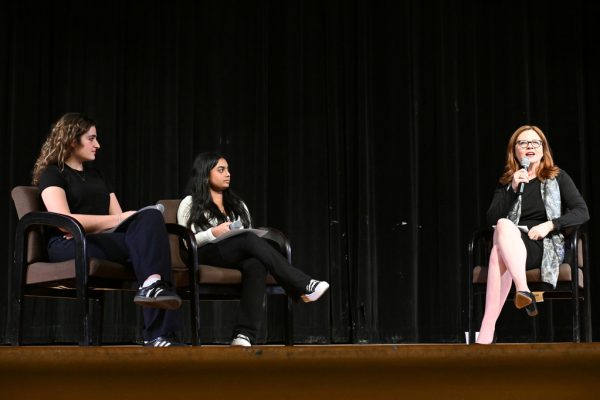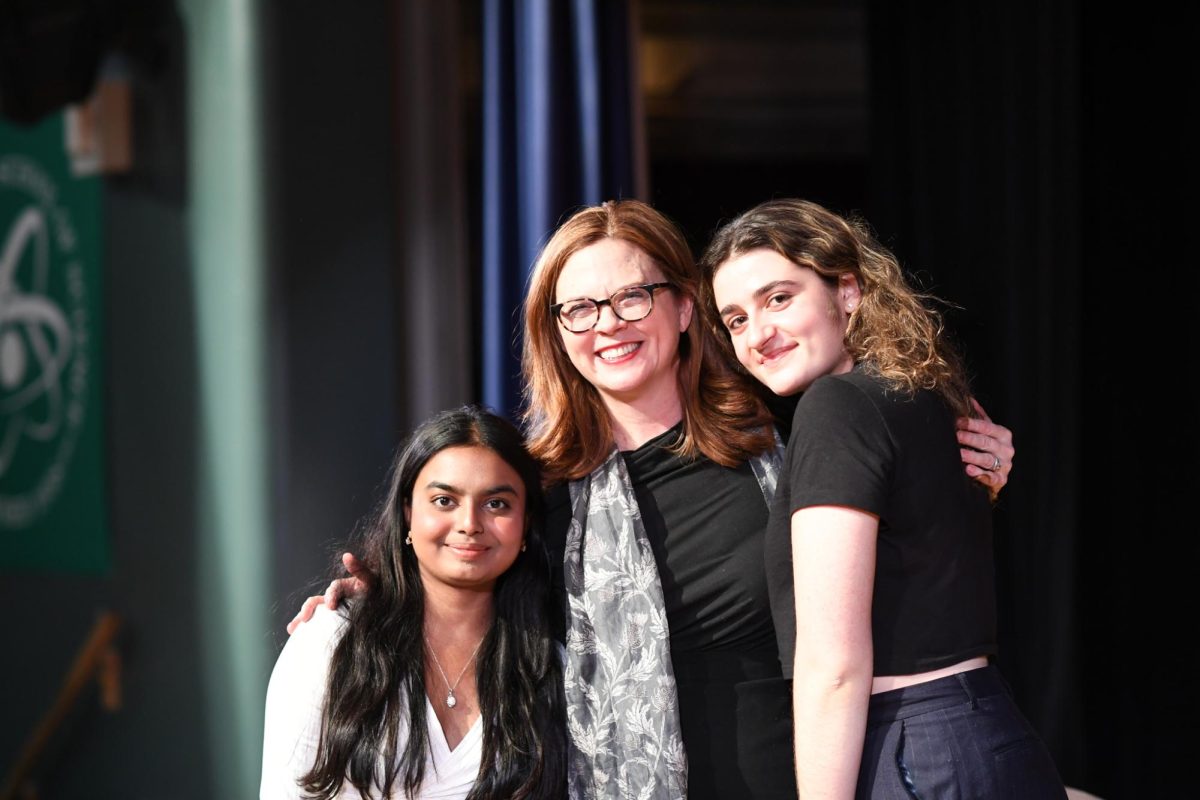On February 10th, 2022, Tania Tetlow was named the 33rd president of New York City’s Fordham University. She took office later that year, on July 1st, 2022, as the first woman and layperson to lead the institution. With a remarkable history in law, education, administration, and Jesuism, Tetlow spoke to the students and faculty of Bronx Science this past October 25th, 2023. During her 40-minute interview, she gave insight beyond just her career and journey to becoming Fordham’s president, as her wise words apply not just to college but to life.
Born in New York City to Louis and Elisabeth Tetlow, the new president has roots in both Jesuism and Fordham. Her father was a clinical psychologist and former Jesuit Priest, and her mother was a Biblical scholar and author. When the two met as graduate students at Fordham University in the late 1960s, her father decided to leave the priesthood to pursue a family. Six years after Tania Tetlow was born, the family moved to New Orleans, where she would spend the rest of her upbringing.
Tetlow entered high school at the age of 12 and college at the age of 16. She graduated cum laude from Tulane University in 1992 with a B.A. in American Studies and magna cum laude from Harvard Law School in 1995 with a Juris Doctor degree.
Upon graduating, Tetlow pursued a career in law. She was an associate at Phelps Dunbar and an assistant United States attorney for the Eastern District of Louisiana, until she made the transition to higher education.
Although she was at first worried that becoming a professor might isolate her from the day-to-day world, her love for teaching overruled her hesitations, “I was the one who liked to learn my subjects in high school, and in college, and in law school, by helping my friends learn the subject, by teaching,” she told students in the packed auditorium at Bronx Science. In 1998, on top of her busy schedule, she volunteered to teach a nightly law school course on Constitutional law and race at Loyola University.
She stopped pursuing law and began teaching full-time in 2005 when she became the Felder-Fayard Professor of Law and Director of the Domestic Violence Law Clinic at Tulane University. “This job opened up on the Tulane law faculty where I could run a domestic violence clinic, an issue I cared a lot about.” She said, “I could teach, but also represent real clients and try to save their lives, and I could do policy work for my community and help police departments do this work better by training and supporting them. I could decide what I really believe and think by writing law review articles, that hopefully, someone other than my mother would read. It just seemed like the perfect fit for me, so I jumped into academia.”
Her contributions to the Domestic Violence Law Clinic brought her to Egypt, Rwanda, and Iran, where she advised government law clinics regarding domestic violence policy.
Thereafter, her career only continued to evolve. After ten years of teaching, she was named the Senior Vice President and Chief of Staff at Tulane University. However, she left the administration in 2018, when she was elected the 17th president of the neighboring University, Loyola New Orleans. Akin to her position at Fordham, Tetlow was the first woman and layperson to hold this prestigious title at Loyola.
Tetlow has been a trailblazer her whole life. From being significantly younger than her peers upon appointment, to leading two famously Jesuit institutions as the first woman and layperson, Tetlow is a symbol of progress and perseverance for the world. But as she knows, progress seldom comes without adversity. She describes her experience in overcoming stereotypes optimistically. “The older I’ve gotten, the more comfortable I am in my own skin… I get to represent an idea of progress, of the future, of what it means to invest in talent regardless of demographics even before I open my mouth,” Tetlow said. “It’s also a chance to speak with a different voice. I can talk about who we are, why we matter, and in ways that people listen to differently.”
Amidst her interview at Bronx Science, she informed the Bronx Science community that her constant question, “How am I going to matter most to the world?” is what prompted her to uproot herself from New Orleans. She deemed New York City as the place where she could make a difference on a larger scale.
Although Loyola saw a significant turnaround under Tetlow with increased enrollment success, growth in academic programs, and a set clear, attainable future, Tetlow needed a way to leave a greater mark on the world. “Right now, when the world feels like it’s coming apart at the seams, I can’t even watch the news some days, because it’s so hard.” She said during her visit, “It’s not that I have illusions that I can fix it, but I want to look back on my life and think I did everything I could to try.”
In addition to her history with Fordham, Tetlow’s values clearly correlate with those of Fordham. Founded in 1841, Fordham University was initially founded as a means of providing food, shelter, jobs, education, and opportunity to the millions of Irish Catholics who were immigrating to the city but weren’t welcome at the elite, protestant institutions at the time. Fordham quickly welcomed students of all minorities, and it became an institution founded on inclusion.
Since its birth, Fordham has been a Jesuit institution. However, “the role that religion plays at Fordham is that if you are a person of faith, you get to be that without embarrassment,” Tetlow explained, “We will talk about religion more than you would at a public school, but we’ll talk about it very much in the way of understanding all the world’s great religions, of the things they teach us, and what they have in common.”
Fordham’s priority of inclusion has remained constant to this day, and it relates not only to religion, but to race and gender. As the university deals with the Supreme Court overturning Affirmative Action, Tetlow confirmed that Fordham will compete as much as they can for diversity. “We know we don’t have our best and brightest here until our student body looks like the world,” Tetlow said. Fordham annually spends tens of millions of dollars on financial aid and merit scholarships in order to make themselves accessible to as many people as possible.
Tetlow aspires for Fordham to be not only built on inclusion but to also be a foundation for worldwide equity. This was undoubtedly a driving force in her transition from New Orleans to New York City, as the ties New York holds would allow for easier worldwide connections. “The chance to be at the table with the people making so many of the decisions, not just in this country but around the world, is pretty serious. And Fordham gets to be a player in that, gets to convene those world leaders, and gets to be a part of the conversation on how to make the world a better place,” Tetlow said.

While Tetlow treasures inclusivity, she also emphasizes the importance of individuality and awareness. She believes that it is important to notice the things that impair us and differentiate us, without allowing them to hinder our accomplishments. “For me in life, it’s been about being aware of the obstacles, because thinking they don’t exist will just drive you crazy; they are real, and they do exist, and you need to know about them. But don’t let them keep you from doing what you want to do.”
She spoke about the importance of this awareness coming across in college applications. “What we’re looking for, and what’s really hard at your age, is some sense that you know yourself. Who are you?”
Universities look for students who have a genuine desire to improve the world. She described Fordham’s atmosphere as one with students who are “purpose-driven in a joyful way.” Likewise, “The culture is ‘chicken and egg;’ the students are attracted to us, and then they created the culture themselves.”
Tania Tetlow embodies her values of curiosity and pursuit of one’s true interests in her day-to-day life. While her career started off in the field of law, in a matter of years, it veered off in an utterly different direction. Fordham University looks for the same passion and initiative in their students.
“What we teach you at Fordham University is for you. It’s because we want you to matter in the world, however you choose to matter. We want you to find not just your first job, not just your career, but also what’s going to motivate you, and give you joy, and make you feel like you can make a difference.”
It is Tania Tetlow’s receptiveness to change that granted her such a broad range of fulfilling accomplishments. She’s allowed herself to evolve and change with her passions, an intimidating concept, especially as we begin to contemplate our own career paths during our high school careers at Bronx Science. However, while many fear this constant instability and change that life guarantees, Tetlow embraces it. She is indisputable proof that, to be successful, we don’t need to remain with one thing our entire lives. In fact, Tetlow disclosed that her passions lie in more than just law and education when she said, “In an alternate world, I would have been a journalist.”
She commenced her visit by telling the Bronx Science students in the auditorioum, “It is not true that there is one right school for you, and all the rest are terrible. There are so many places where you will get a brilliant education, and where you will flourish in life. What you need to find is where you think you’ll be happiest, because that’s where you’ll succeed. That’s what will matter more.”
As we Bronx Science students continue to think about our futures, we need to keep Tania Tetlow’s advice in mind. We need to keep an open, curious, and dedicated mind, in order to allow ourselves to change alongside our interests. By doing so, we might just end up where we want to be.
“What we teach you at Fordham University is for you. It’s because we want you to matter in the world, however you choose to matter. We want you to find not just your first job, not just your career, but also what’s going to motivate you, and give you joy, and make you feel like you can make a difference,” said Tania Tetlow, President of Fordham University.

